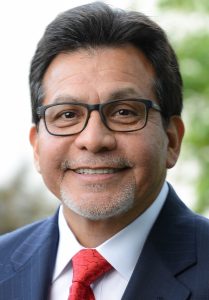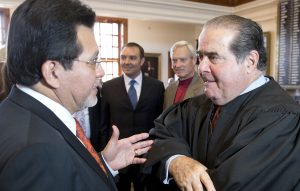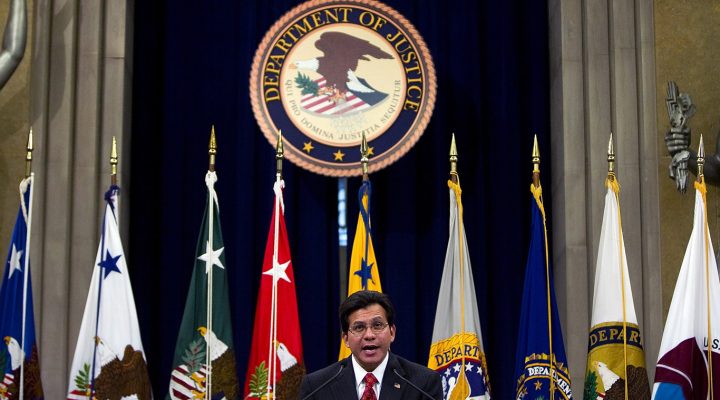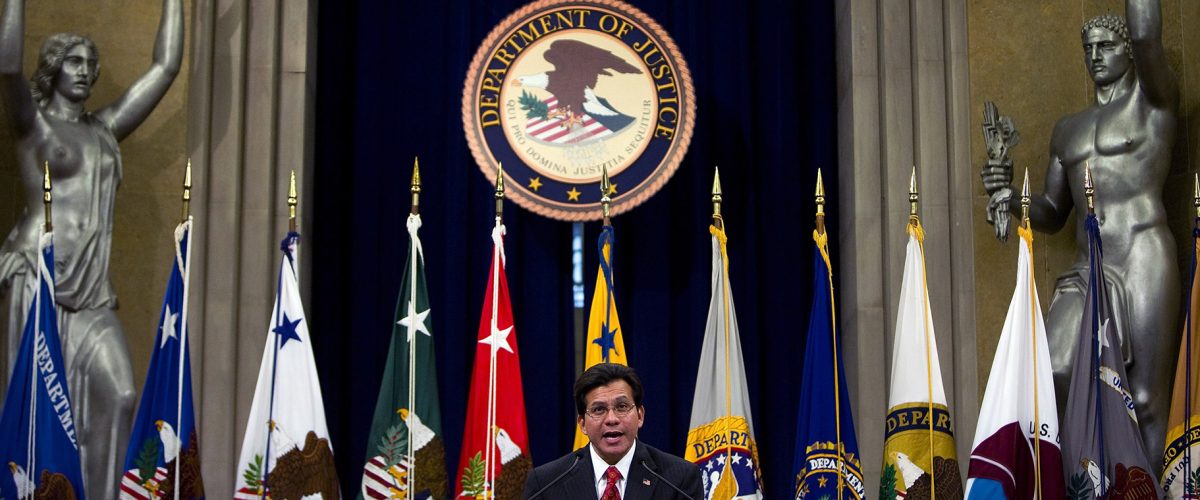With students walking by in the distance, former U.S. Attorney General Alberto Gonzales, now dean of the Belmont University College of Law, still understands what life in the spotlight requires.
In an exclusive interview with Baptist New Global, the nation’s first Hispanic attorney general speaks with ease to explain some of the toughest cases of the day — including the legal issues facing former U.S. President Donald Trump.
Gonzales, who was appointed attorney general by former President George W. Bush, answers even that controversial question with a factual approach, as if teaching a seminar on the law and current events.

Alberto Gonzales
“The Department of Justice became aware through a series of sources that the former president was engaged in some kind of conduct that (allegedly) constituted a federal crime. There’s a great deal of discretion in the minds of prosecutors. But if they believe that perhaps there’s something there, they then do some investigations,” he explained. “And that means gathering up information; typically, that begins with discussions, phone calls to gather up information.
“As things progress, you move to the subpoena stage if you’re not getting any cooperation. But you really have some pretty good idea that perhaps a crime has been committed. Then you do a search, which is the most intrusive, which is what happened at former President Trump’s Florida estate.
“At this point, there’s still no decision by the prosecutors as to whether or not they’re going to charge the former president. They have a pretty good idea (that) possible criminal statutes have been violated. But once they get all this information, they make a decision to charge, which goes through the process of convening a grand jury. We’re in the stage now of gathering information.”
Then he gives the context based on his own experience.
“I only signed off on one search, and that search involved the search of a congressman’s office on Capitol Hill.”
“It is extremely rare for the attorney general to personally be involved in a decision relating to a search. There are searches that occur every day all around this country,” he said. “It goes to the U.S. attorney, individual office criminal division, perhaps even the deputy attorney general on major cases. But for the attorney general to be involved in signing off on a search; the three years or so that I was attorney general, I only signed off on one search, and that search involved the search of a congressman’s office on Capitol Hill.”
That involved Rep. William Jefferson, a Louisiana Democrat under investigation for bribery.
“It was a pretty big deal because in the history of our country the FBI had never conducted [a] search on Capitol Hill,” Gonzales said. “We had numerous discussions about it. I asked questions like: What other evidence do we have? Why do we need to do this? Why do we need to do this now? What efforts have we made to get this information in other ways? These are the kinds of questions an attorney general asks, and ones I asked.”
In 2009, Jefferson was found guilty on 11 of 16 corruption counts. He was sentenced to 13 years in prison, the longest sentence ever given to a representative for bribery or any charge.
But getting to that conviction was a challenge for Gonzales.
“After the search was done, I got a call from the chief of staff that the president of the United States wants to talk to me about the search because the speaker of the House at that time was furious. It’s a big deal for the attorney general to approve of a search. The reporting is that Merrick Garland took some time to make this decision, which he should have.”
Despite moments of anxiety like signing off on that search warrant, it is clear that Gonzales enjoyed his service and he fondly remembers those days.
“God puts us on this earth to make a difference, to serve.”
“God puts us on this earth to make a difference, to serve, whether it be in the positions of either White House counsel or attorney general of the United States,” he explained. “It was a great privilege and tremendous responsibility. It is why I went to law school — to make a difference.
He doesn’t miss everything about that role, however. “I don’t miss having to deal with the press, I don’t miss having to go to Capitol Hill to defend my decisions, even when I know I’m right. I don’t miss all of that, but I would do it again in a second. My wife wouldn’t let me do it again though.”

In 2013, U.S. Supreme Court Justice Antonin Scalia, r, visits with former U.S. Attorney General Alberto Gonzales, as he takes part in the investiture of Texas Supreme Court Chief Justice Nathan Hecht at the Texas Capitol. (Photo by Robert Daemmrich Photography Inc/Corbis via Getty Images)
Now in his role as dean of the law school at Belmont, a historically Baptist school in Nashville, Tenn., Gonzales brings a record of service that informs his view on current events across many topics.
Regarding the recent announcement that the Southern Baptist Convention is under investigation by the Department of Justice related to sexual abuse cases, Gonzales admits he doesn’t know much.
“I know little beyond what may have been reported in the press. What may have led to this investigation is that authorities have gotten information that there’s been some kind of wrongdoing.”
And as with the Trump case, Gonzales believes this investigation will need to play out. There are still too many unknowns.
But when it come to the controversial Supreme Court ruling that tossed out the federal right to abortion mandated in 1973 in Roe v. Wade, he’s more decisive: He thinks the court got this one right.
“There’s no constitutional right to an abortion now. But then you have to turn to the states. Of course, that then has raised questions about travel and people having to go out of state. Legally it’s really now in the hands of the people, along with their state legislatures acting on behalf of their constituents, (which is) where it should have begun in the first place. There is no right to an abortion in our Constitution.”
Yet he also realizes the politics of the situation.
“I know this decision has hurt the reputation of the court in certain segments of America.”
“I know this decision has hurt the reputation of the court in certain segments of America,” he said. “There is a fundamental change in the composition of the court, and that’s never a good thing. So I think the court has taken a hit, which I think is very unfortunate. However, I think the court had no business weighing in on this in the first place, simply because the right to abortion doesn’t exist in the U.S. Constitution.”
These are the kinds of lessons he believes the next generation of lawyers and jurists must understand — which is why he’s in academia now.
“I don’t get to teach much because of all the administrative responsibilities I have. I just teach one course this semester. But the thing I like about being at a law school is that I feel like, at least I hope, we’re preparing the next generation of leaders.
“Lawyers are champions for those who are needy, for those who are poor,” he said. “Despite all the lawyer jokes, when someone gets in trouble, they’re going to call [a] lawyer.”
Related articles:
Attorney General Gonzales announces ‘First Freedoms Project’ to SBC leaders
Hispanic attorney general draws praise from conservative groups
Supreme Court agrees to expand scope of ‘partial-birth abortion’ case


